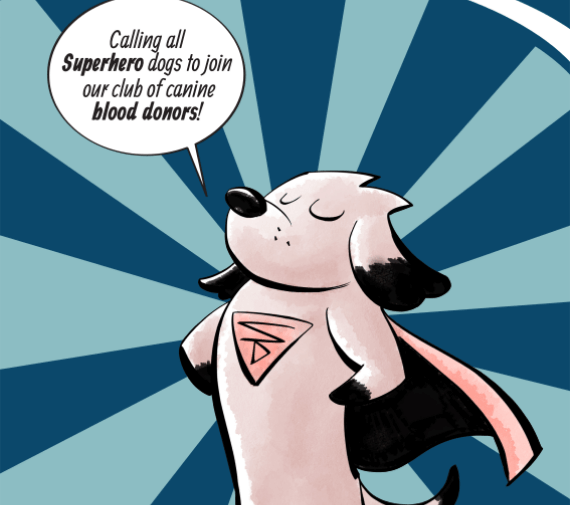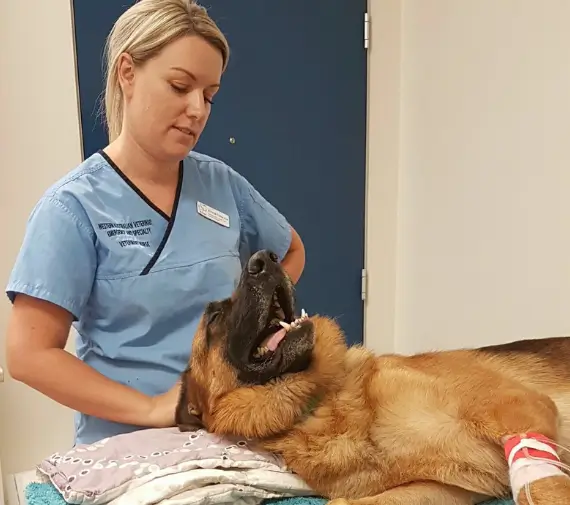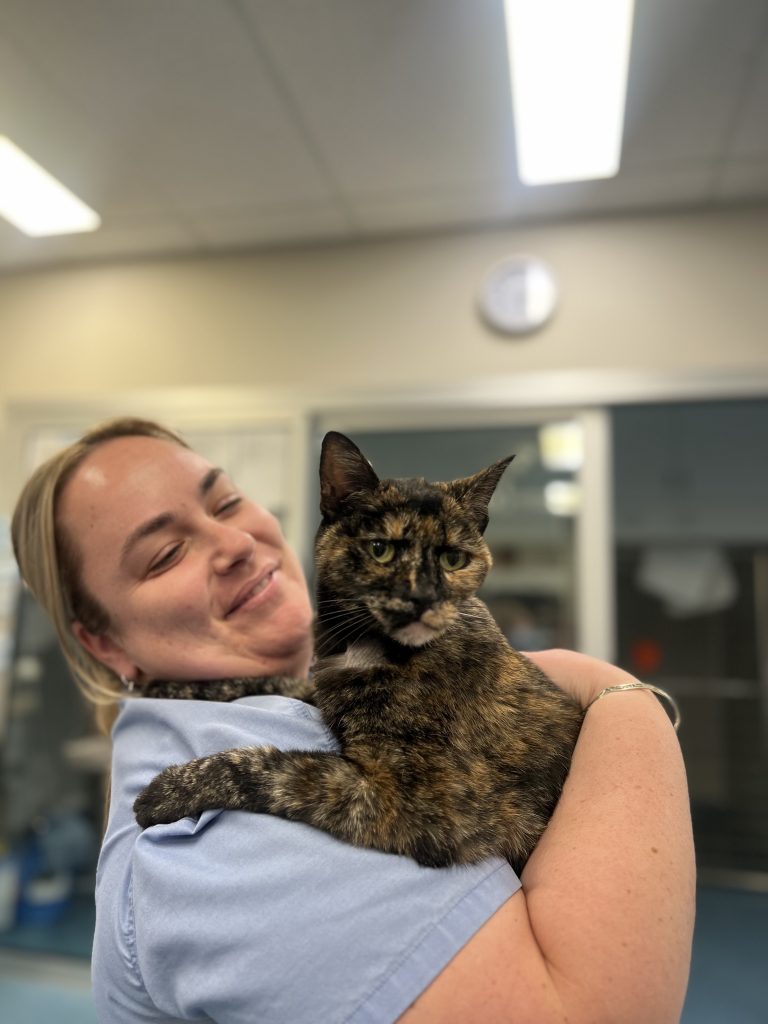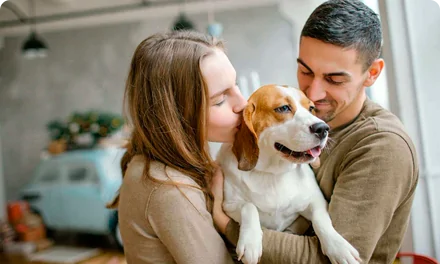
Blood Donors – Dogs
Good dog, good donor?
BLOOD DONORS
Our Canine Blood Donation Program
At WAVES we frequently have patients who require life-saving blood donations to help them survive. We source a small portion of our blood products from a canine blood bank based in Queensland. However, we operate a blood donation program to ensure we have adequate supplies of blood and plasma products for any dog that may need a life-saving transfusion.
DONATE NOW
CANINE BLOOD DONOR REQUIREMENTS
Could your dog be a blood donor?
Our blood donation program relies on staff dogs and members of the public’s dogs who regularly donate. If you own a big dog and would like to consider allowing them to be included in our donor program, please read through the following information.

CANINE BLOOD DONOR REQUIREMENETS
In order to be considered for the program, your dog needs to meet the following requirements:
• Be friendly and does not get stressed when visiting the vet.
• Be happy and healthy, with no heart conditions.
• Be between 1 and 7 years of age.
• Weigh 28kg or more.
• Have never received a blood or plasma transfusion.
• Receive regular heart worm prevention.
• Be up to date with vaccinations.
It is also of great importance that your dog has an agreeable temperament (excitable is fine but no fear biters) as we want the experience to be a positive one which means that they will look forward to their next visit. This includes lots of praise and treats! Our nurses will explain the entire blood collection process to you, in detail, to ensure your dog is suitable and that you are happy with the process before we begin. As part of the screening process, a veterinarian will perform a complete physical examination of your dog to ensure that they are fit and healthy. If there are no concerns about health issues, we can proceed with checking their concentration of red blood cells (PCV) to ensure they are not anaemic. This blood sample is taken through an intravenous catheter which is placed into one of their front legs. If their PCV result is normal, we can then proceed with the blood donation process.
What to expect
For most first-time donors we prefer to collect the blood donation from the leg as they can move around a little more during the collection process. This is completed through the intravenous catheter as mentioned above. To encourage blood flow, the leg may be lifted up and down repeatedly (this mimics hand squeezing used by human donors). Up to 450mls of blood is collected into a blood bag. Occasionally we can complete the donation via collection from the jugular vein. This is quicker but requires the dog to lie very still on their side for at least 15 minutes. After the donation, your dog will receive intravenous fluids to replace the volume collected. However, sometimes this fluid is not required if your dog is keen to drink water right away.

What are the risks?
There are minimal risks to the donor and most dogs suffer no ill effects. Occasionally, donors may be a little tired, and nauseous within a couple of hours after donating (just like people can when they donate). For their safety, donors should not be heavily exercised on the day of donation and have only short, non-intensive exercise sessions over the following 2 days. After this, they can return to their normal activity. At all times, we take extreme care to avoid any risks to the donor, however like any other medical procedure we cannot guarantee that they will not suffer adverse effects. On the rare occasion where a dog may suffer adverse effects, full treatment will be provided at no charge to the owner.
Can I stay with my dog?
As an owner, you are welcome to accompany your dog during the process of blood donation. However, if you prefer not to be present, be assured that our well-trained nurses and vets are on hand to provide high-quality care and ensure your dog is comfortable and enjoying the experience.

Past Orthopaedic Surgery Donors
Some of our large patients who have had orthopaedic surgery can donate blood when they come back for post operative radiographs a couple of months after their surgery. In this situation the blood collection is done at the end of their anaesthetic. This is only ever done with the owners knowledge and consent.
canine blood donors
Why we require blood donors
• Severe trauma e.g. motor vehicular accident,
• Rat bait toxicity,
• Von Willebrand disease (common in Dobermans),
• Haemophilia,
• Haemolytic anaemia (secondary to immune mediated diseases or onion toxicity),
• Blood loss during major surgery of the liver, spleen or other organs,
• Cancer.

A blood donation takes approximately 1 hour and comes at no cost to you. In return, your pet will receive a free examination, a free comprehensive blood test annually, a small thank you gift from us, and the deepest gratitude from our patients, their families, and our staff. The entire procedure from the donation to the transfusion is completed by highly trained staff at the WAVES veterinary hospital. If you would like to register your dog into the blood donor program at WAVES, or you have any questions, please do not hesitate to contact us via email at bloodbank@wavets.com.au.
CANINE BLOOD TRANSFUSIONS
General information about blood transfusions in dogs
The collected blood is most commonly spun down in a refrigerated centrifuge and separated into plasma which is frozen and packed red blood cells which remain refrigerated. It is occasionally not separated and stored as whole blood or used immediately after collection as fresh whole blood. Packed red blood cells and whole blood can be stored in a refrigerator for up to 5 weeks and plasma can be stored in a freezer for up to 1 year.
Dogs have more than a dozen blood antigen groups (Called DEA 1.1, DEA 1.2, DEA 4, DEA 7, etc.) and an individual dog can be positive to more than 1 type of antigen. Testing is generally only available for one type of antigen (DEA 1). Dogs are not born with antibodies to other blood types and are therefore able to receive untyped or unmatched blood on their first transfusion. Following transfusion, antibodies will eventually develop and subsequent transfusions will generally require a laboratory test (cross-match) to be performed to assess for the risk of a transfusion reaction occurring. A cross-match is ideally performed in a specialist veterinary laboratory. This combines the recipient and donor’s blood and plasma to check for compatibility or reactions. All patients receiving a transfusion are monitored very closely to assess for reactions.
GET STARTED
Register your dog as a donor
If you are considering registering your dog as a blood donor, click on the link below and get in contact with us.
DONATE NOW
LATEST
News & Other Stories
MORE BLOG POSTS
Thank you for considering our donor program. Please complete the form below with your details and the donor details and we’ll be in touch with further information.
CONTACT US
Veterinary Referral & Emergency Services
CONTACT US

